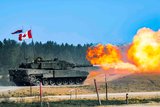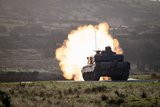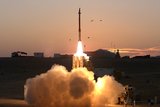General Dynamics to continue Saudi Abrams work
General Dynamics Land Systems will continue work to procure and produce the Saudi M1A2 (M1A2S) Abrams tank for the Kingdom of Saudi Arabia under a $40 million contract modification announced on 2 April.
The work will be performed under a foreign military sales (FMS) contract awarded by the US Army TACOM Life Cycle Management Command on behalf of the Royal Saudi Land Forces.
This contract extends work started in 2008 to update M1A1 and M1A2 tanks to the M1A2S configuration for the Kingdom of Saudi Arabia. The M1A2S conversion increases the efficiency and capability of the tank.
General Dynamics said that work on the contract is expected to be complete by July 2014.
More from Land Warfare
-
![US DoD task force’s DroneHunter acquisition lays groundwork for Replicator 2 CUAS strategy]()
US DoD task force’s DroneHunter acquisition lays groundwork for Replicator 2 CUAS strategy
As the US Department of Defense looks to counter the growing threat of uncrewed aerial systems to improve homeland security, the DroneHunter acquisition could point to future commercial innovation.
-
![Norway opts for Hanwha’s Chunmoo for long-range fires under $2 billion deal]()
Norway opts for Hanwha’s Chunmoo for long-range fires under $2 billion deal
The selection of Hanwha’s K239 Chunmoo long-range precision fires system, with a contract expected to be signed on 30 January, makes Norway the second European country to choose the system. It is expected an operational system will be in service within four years.
-
![Layered protection: How air defence is adapting to rising drone and missile threats (podcast)]()
Layered protection: How air defence is adapting to rising drone and missile threats (podcast)
A surge in aerial threats – from advanced missiles to low-cost drones – is reshaping the way militaries approach air defence, driving demand for flexible, multi-layered solutions.






















